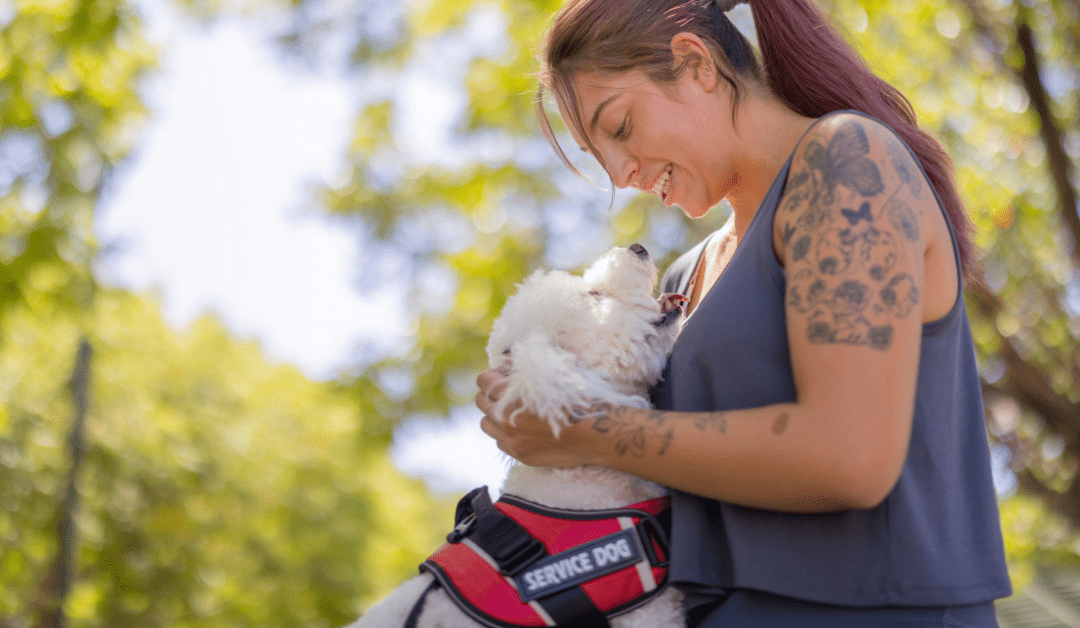Have you ever seen someone with a loyal canine companion by their side, not just a pet, but a partner in navigating the world? These special dogs are Disability Service Animals (DSAs), and the bond they share with their handlers is truly remarkable.
Today, we’ll explore the wonderful world of DSAs, celebrating the incredible ways they lend a paw and enrich the lives of their human companions.
A Spectrum of Support: Different DSAs for Different Needs
First, let’s break down the different types of DSAs. The most familiar might be service dogs, often trained to perform specific tasks that directly address a disability.
For someone with mobility challenges, a service dog might help with opening doors, picking up dropped items, or even providing balance and stability. For those with visual impairments, guide dogs offer a safe passage, navigating streets and obstacles.
But the world of DSAs extends beyond dogs! Miniature horses can be trained as service animals, particularly for those who need balance support but might have allergies to dogs. Some people with hearing loss benefit from having a trained service dog that can alert them to sounds like doorbells, fire alarms, or even alerting signals from other medical equipment.
Beyond Tasks: The Emotional Power of DSAs
While tasks are undeniably important, the impact of DSAs goes far deeper. These furry companions provide a constant source of love, support, and companionship. For someone who might struggle with anxiety or social interaction, a DSA can be a calming presence, offering a sense of security and emotional well-being.
Studies have shown that interacting with a DSA can lower blood pressure, reduce stress hormones, and even ease symptoms of depression.
A Well-Trained Team: The Journey of a DSA
DSAs aren’t born with their service skills; they undergo rigorous training programs.
Trainers work tirelessly to develop a strong bond with the animal, teaching them specific tasks while also ensuring excellent obedience and focus in distracting environments. The potential handler also plays a crucial role, learning how to communicate effectively with their DSA and build a trusting partnership.
Public Access: Welcoming DSAs Everywhere
By law, DSAs are granted access to all public places where the general public is allowed. This includes restaurants, shops, offices, and even airplanes. It’s important to remember that DSAs are working animals, not pets. They should be treated with respect and given the space they need to perform their vital tasks.
If you see someone with a DSA, a simple smile or a kind word of acknowledgment goes a long way!
Considering a DSA?
If you or someone you know has a disability that could benefit from a DSA, the first step is to consult with a healthcare professional.
They can assess your needs and determine if a DSA would be a good fit. Several reputable organizations specialize in training and placing DSAs, and they can guide you through the application process.
Have you ever seen someone with a loyal canine companion by their side, not just a pet, but a partner in navigating the world? These special dogs are Disability Service Animals (DSAs), and the bond they share with their handlers is truly remarkable.
Today, we’ll explore the wonderful world of DSAs, celebrating the incredible ways they lend a paw and enrich the lives of their human companions.
A Spectrum of Support: Different DSAs for Different Needs
First, let’s break down the different types of DSAs. The most familiar might be service dogs, often trained to perform specific tasks that directly address a disability.
For someone with mobility challenges, a service dog might help with opening doors, picking up dropped items, or even providing balance and stability. For those with visual impairments, guide dogs offer a safe passage, navigating streets and obstacles.
But the world of DSAs extends beyond dogs! Miniature horses can be trained as service animals, particularly for those who need balance support but might have allergies to dogs. Some people with hearing loss benefit from having a trained service dog that can alert them to sounds like doorbells, fire alarms, or even alerting signals from other medical equipment.
Beyond Tasks: The Emotional Power of DSAs
While tasks are undeniably important, the impact of DSAs goes far deeper. These furry companions provide a constant source of love, support, and companionship. For someone who might struggle with anxiety or social interaction, a DSA can be a calming presence, offering a sense of security and emotional well-being.
Studies have shown that interacting with a DSA can lower blood pressure, reduce stress hormones, and even ease symptoms of depression.
A Well-Trained Team: The Journey of a DSA
DSAs aren’t born with their service skills; they undergo rigorous training programs.
Trainers work tirelessly to develop a strong bond with the animal, teaching them specific tasks while also ensuring excellent obedience and focus in distracting environments. The potential handler also plays a crucial role, learning how to communicate effectively with their DSA and build a trusting partnership.
Public Access: Welcoming DSAs Everywhere
By law, DSAs are granted access to all public places where the general public is allowed. This includes restaurants, shops, offices, and even airplanes. It’s important to remember that DSAs are working animals, not pets. They should be treated with respect and given the space they need to perform their vital tasks.
If you see someone with a DSA, a simple smile or a kind word of acknowledgment goes a long way!
Considering a DSA?
If you or someone you know has a disability that could benefit from a DSA, the first step is to consult with a healthcare professional.
They can assess your needs and determine if a DSA would be a good fit. Several reputable organizations specialize in training and placing DSAs, and they can guide you through the application process.
The Ripple Effect: How DSAs Make a Difference
The impact of DSAs extends far beyond the individual handler. By promoting independence and inclusion, DSAs challenge societal perceptions of disability. They open doors (literally and metaphorically) and pave the way for a more inclusive world. Seeing a person with a DSA confidently navigating their environment can inspire others and foster a sense of community and understanding.
Living Proof: Stories of Transformation
Perhaps the most inspiring aspect of DSAs is the incredible stories of transformation they create. Imagine a young girl with autism who, thanks to her service dog, can finally join in playground games. Or a veteran struggling with PTSD who finds solace and a renewed sense of purpose in his bond with his service dog. These are just a few examples of the countless lives enriched by the unwavering support of DSAs.
Fun Facts about Disability Service Animals
Did you know there’s more to DSAs than meets the eye? Let’s delve into some fascinating facts about these remarkable animals:
-
Not all heroes wear capes… some wear vests! Many DSAs wear special vests or harnesses that identify them as working animals. This helps raise awareness and ensures they’re given the space they need to perform their tasks.
-
Super sniffers! Some DSAs are trained to detect medical conditions. For instance, a dog might be trained to detect the onset of a diabetic seizure by recognizing subtle changes in a person’s scent.
-
Brainy bunch! Intelligence and trainability are crucial for DSAs. While breeds like Labrador Retrievers and Golden Retrievers are popular choices, any dog with the right temperament and aptitude can be trained as a service animal.
-
Early intervention makes a difference! Puppies with the potential to become DSAs can begin training as early as 8 weeks old. This socialization period allows them to become accustomed to different environments and build strong bonds with their trainers.
-
Lifelong learners! A DSA’s training doesn’t stop after initial certification. Regular practice and reinforcement are essential to maintain their skills and ensure they can continue to effectively assist their handlers.
-
They’re not all about work (though they are very good at it)! When a DSA is off-duty, they enjoy playtime and relaxation just like any other pet. Responsible handlers ensure their furry partners have opportunities to unwind and have fun.
-
Celebrities with DSAs! Many celebrities rely on the unwavering support of DSAs. Singer Josh Groban’s Golden Retriever, Quincy, is a trained service dog, and actress Selma Blair often steps out with her service dog, Beatrice.
-
Breaking barriers, one wag at a time! The increasing visibility of DSAs is changing perceptions and promoting disability inclusion. Seeing these animals confidently navigating public spaces helps to break down stereotypes and foster a more understanding society.
Furry Friends, Forever Family
The bond between a person and their DSA is truly special.
These animals offer not just practical assistance, but also unwavering companionship and emotional support. They are a constant source of love, loyalty, and a furry shoulder to lean on. The next time you encounter a DSA, remember the incredible journey they share with their handler.
They are a testament to the power of the human-animal connection and the life-changing impact these furry heroes can have.
So next time you see a person with a DSA, remember the incredible partnership they share. These furry companions are more than just pets; they are life-changing partners, offering a helping paw on life’s journey.
Want A Helping Hand?
Hope Human Services provides disability services in Washington State. Our team doesn’t just provide support, but creates exceptional life experiences.

